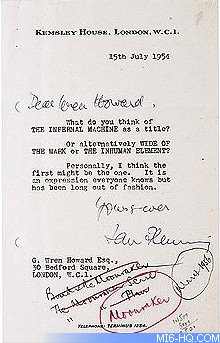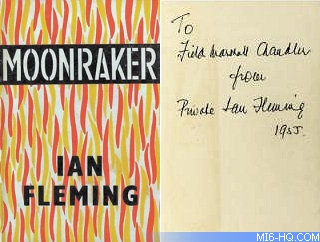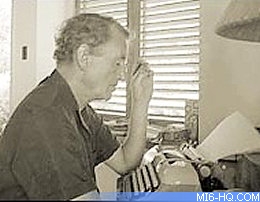|
|
|
 |
| |
MI6 looks back at the titles Ian Fleming mused over
before ultimately naming his third James Bond novel
"Moonraker"...
|
|
Ian Fleming History - Moonraker
25th April 2005
On July 15th 1954, almost nine months before it was was published,
Ian Fleming mused over the title of his third James Bond novel.
| The Infernal Machine
Ian Fleming wrote to Mr G. Wren Howard, on the board of
London-based publisher Jonathan cape, discussing potential
titles.
"What do you think of THE INFERNAL MACHINE as a title?
Or alternatively WIDE OF THE MARK or THE INHUMAN ELEMENT?
Personally, I think the firs might be the one. It is an
expression everyone knows but has been long out of fashion."
Below the copy of the letter are various scribbled titles
that Ian Fleming discarded (including "Bond and the
Moonraker", "The Moonraker Secret" and "The
Moonraker Plot"), until ultimately deciding upon "Moonraker".
Right: The letter Ian Fleming wrote to
Mr G. Wren Howard in July 1954.
|
|
 |

Above: A first edition copy of "Moonraker"
inscribed by Ian Fleming to Raymond Chandler. |
|
Raymond Chandler
Upon "Moonraker" being published, Ian Fleming
inscribed a copy to his friend and fellow author Raymond
Chandler.
“To Field Marshall Chandler, from Private Ian Fleming,
1955.”
Fleming’s admiring and deferential inscription did
not divert Chandler from looking at Moonraker with a close
or critical eye: at the end of Chapter 1, on page 18 of
his first edition, Chandler wrote in large, underlined,
lettering“all Padding”; on the first text page,
he penned in the margin “2½ barrel,”
referring to the “Colt Detective Special” named
in the book; and on the rear inside flap Chandler wrote
several memos and notes to himself - about 24 words.
|
Fleming and Chandler became friends after first meeting at a
dinner in London in May 1955. “Fleming treated him with
the deference he reserved for very few. Chandler had arrived in
England a month before (April) and was just emerging from a long
spell of drinking that had followed the death of his beloved wife
Cissie...the year before...Two more different characters than
the creators of Philip Marlowe and James Bond it would be hard
to find, but since that dinner at the Spenders’ they had
met on several occasions and got on well together”, John
Pearson wrote in "The Life of Ian Fleming".
| The biography describes how their meeting came at a pivotal
moment in Fleming’s literary career. “The friendship
between the two men...was to prove of importance to Fleming
and also James Bond. Indeed, but for Chandler it is more than
likely that Fleming would have finished off his hero for good
at the big desk at Goldeneye [his home in Jamaica] the following
year. For when he came back to London from [the island] with
the manuscript of Diamonds Are Forever in March 1955, Fleming
had had enough of his creation...However good the reviews
of Moonraker had been when it was published that April [1955],
and however much better he privately believed Diamonds Are
Forever to be, he seems to have convinced himself that he
had gone as far with writing about James Bond as he ever would
or could” |
|
 |
It was at this point that Chandler encouraged the younger author,
praising the second Bond novel Live and Let Die (Fleming apparently
had a copy sent around to Chandler’s nearby apartment for
him to read) and writing a testimonial about the book for Fleming’s
publishers. “The interest and support of Chandler had come
at a crucial moment for Ian Fleming, and the brief meetings between
them in May and early June [1955], even before the testimonial
was written, had an electric effect on the attitude of Fleming
to his writing and his hero...Chandler’s approval seems
to have made Fleming quickly decide that his next book, instead
of finishing Bond for good, would go to the opposite extreme.
It would be different from any other book he had written, it would
have depth and seriousness. Bond would become a ‘rounded
character’ like Chandler’s hero Philip Marlowe”.
Related Articles
 Ian Fleming Secret History -
Casino Royale
Ian Fleming Secret History -
Casino Royale
 Ian
Fleming Secret History - The Lisl Popper Affair Ian
Fleming Secret History - The Lisl Popper Affair
 Ian
Fleming Secret History - From Russia With Love Ian
Fleming Secret History - From Russia With Love
 Ian
Fleming Biography Ian
Fleming Biography
|
|
|